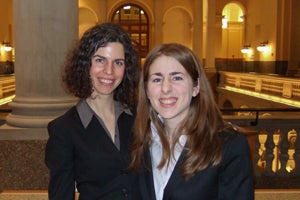In the latest victory for the HLS Clinical Programs’ anti-foreclosure work, the Massachusetts Supreme Judicial Court ruled on Aug. 4 against lenders in a case argued by Harvard Legal Aid Bureau student Jennifer Tarr ’11.
In a 6-0 ruling, the state’s high court agreed with Tarr that lenders trying to evict someone after foreclosure carry the burden of proving the foreclosure was valid. It also held that the state housing court has jurisdiction to hear a challenge to an already-completed foreclosure when the challenge is brought in an eviction case. (See stories in the Boston Globe and Bloomberg.com.)
“The SJC’s decision represents a huge victory for the Bureau and housing advocates throughout Massachusetts,” said David Williams ’12, president of the Harvard Legal Aid Bureau (HLAB), which for several years has been aggressively fighting foreclosures in Boston through its Foreclosure Task Force and Project No One Leaves. “Because of Jen’s successful advocacy, the Foreclosure Task Force will be able to continue the fight against foreclosures in Boston Housing Court.”
Esme Caramello, deputy director of HLAB, and Tarr’s clinical instructor, said Tarr was “incredibly well-prepared and brilliant” in her argument before the SJC, and that lawyers and judges who watched the argument were very complimentary about her advocacy. “It goes to show that the students in our clinical program are doing not just meaningful but extraordinary work on behalf of real clients, and creating good law on current issues,” Caramello added.
Tarr and HLAB represented KC Bailey of Mattapan, whose home was foreclosed on in 2007. When the Bank of New York attempted to evict him in 2009, Bailey argued the foreclosure was invalid because he never received notification from the bank. The bank argued that the state housing court, which was hearing the eviction case, had no jurisdiction to examine the validity of the foreclosure, and the housing judge agreed. Bailey appealed to the Massachusetts Appeals Court, and the Supreme Judicial Court transferred the case, Bank of New York v. KC Bailey, to itself, and found for Bailey. It has remanded the case back to housing court. The unanimous decision was written by Associate Justice Fernande R.V. Duffly ’78, former president of HLAB.
The case has implications for anyone in Massachusetts living in a home that has been foreclosed on, Caramello said. “It clarifies that those people can have their story heard before the housing court or whatever court is hearing the eviction case, and they can’t be evicted unless the bank can prove a valid foreclosure,” she said. Former HLAB student Eduardo Santacana also worked on the case, writing the opening brief to the Massachusetts Appeals Court before transferring in his 3L year to UC Berkeley Boalt School of Law, Caramello noted. Tarr, who will work at the Environmental Law & Policy Center in Chicago, wrote the reply brief.
The Bailey case builds on another major win by the HLS clinics in the SJC last January, when the high court found that Wells Fargo and US Bancorp had wrongly foreclosed on two homes because the banks could not prove that they owned the mortgages at the time of the foreclosure sales. Max Weinstein, a clinical instructor in the predatory lending practice at the HLS Wilmer Hale Legal Services Center, was co-counsel in the case, representing one of the mortgagers, Antonio Ibanez. The court’s decision received national attention.
